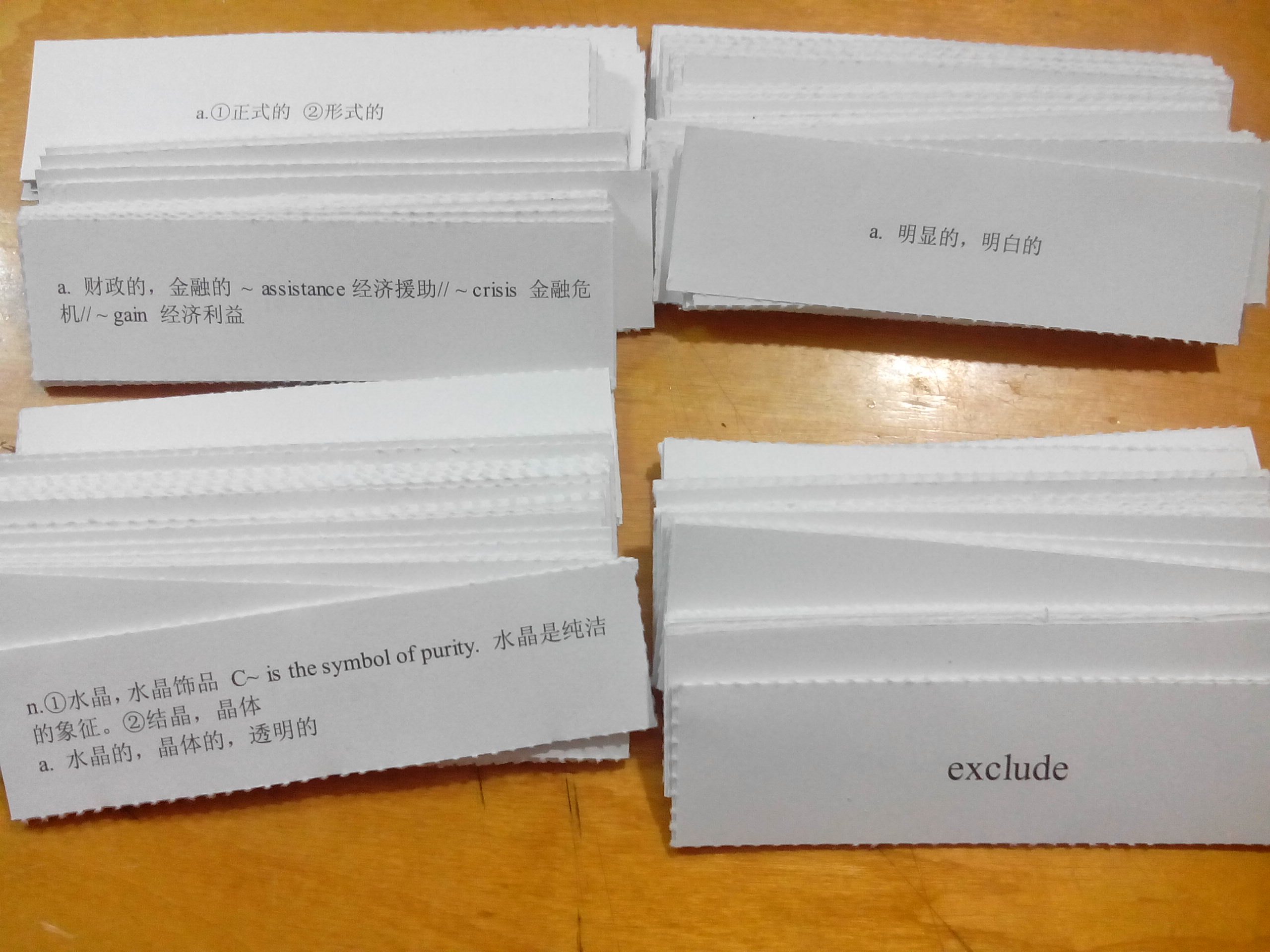 返回
教育头条
返回
教育头条

考研英语每日词汇讲解
今天的考研英语词汇大多不是常用词汇,但是不常用的词汇我们也需要掌握。 常用不常用是相对于总体来说的,对于一份考研英语试题来说,每一个单词都是重点,都需要掌握。 因此平时的词汇复习,不需要区分什么重点不重点核心不核心的,更不要轻信什么两三千个重点或核心词汇就能对付考研英语。
1、audit/dt/
audit意为“审计,查账”,作名词和动词都可以。
The company has an audit at the end of each financial year. 这间公司在每个财政年度的年末都要进行一次审计。
Each year they audit our accounts and certify them as being true and fair. 他们每年对我们进行账务审核,以确保其真实无误。
2、auditorium/dtrim/
auditorium是名词,意为“剧院,礼堂,音乐厅”,嗯可以指“观众席,听众席”。
No smoking in the auditorium. 观众席中禁止吸烟。
The Albert Hall is a huge auditorium. 艾伯特音乐厅是一个大型音乐厅。
3、augment/ɡment/
augment是及物动词,意为“增大,增加,提高”。
He would have to find work to augment his income. 他可能不得不找一些工作来增加收入。
Police units were augmented with newly recruited men and women. 警察部队以新招收的男女扩大了自己的队伍。
4、aural/rl/
aural是形容词,意为“听觉的,听力的”。相对的“视觉的,视力的”是visual。
The information will be held in written, aural, or visual form. 信息将会以书面或视听形式保留。
Artists translate their ideas into visual images.画家把自己的思想转换成视觉画面。
The tall tower adds to the visual impact of the building.高高的塔楼增强了这幢大楼的视觉效果。
5、authentic/θentk/
authentic是形容词,意为“真的,真正的,真实的,可靠的”,或者某个物品“逼真的”。反义词是之前讲过的artificial。
The letter is now accepted as an authentic document. 那封信现在被认为是真实可信的。
She has authentic charm whereas most people simply have nice manners. 她散发出真正的魅力,而大多数人只是举止优雅。
He was there and saw what happened, so his is the only authentic account. 他在现场,并看到了事情的经过,所以他的叙述是**可靠的说法。
6、authority/θrti/
authority是一个重点名词,意思比较多,且都很常见。
首先,意为“当局,”,此时必须用the authorities。
I have to report this to the authorities. 我得向报告此事。
This provided a pretext for the authorities to cancel the elections. 这给当局取消此次提供了借口。
第二,意为“部门,机构”,注意与一条意思的区分。

the health authority 卫生部门
the local housing authority 地方住房管理机构
Any alterations had to meet the approval of the local planning authority. 任何改建都要取得当地规划机构的批准。
第三,意为“权力,权限”。
Nothing will be done because no one in authority takes the matter seriously. 什么也办不了,因为掌权的谁也不认真对待这个问题。
The court held that school officials have the authority to dismiss teachers. 法庭认为学校领导有权开除教师。
第四,指正式的“许可,批准”。The money was spent without parliamentary authority. 使用那笔钱未经国会批准。
The attack took place under the authority of the UN security council. 此次进攻是在联合国安全理事会授权下进行的。
第五,意为“威信,权威”,是个不可数名词,也可用来指人“专家,学术权威”。
He spoke with authority on the subject. 他就这个题目作了令人信服的发言。
He's universally recognized as an authority on Russian affairs. 他是公认的俄罗斯事务专家。
7、automatic/tmtk/
automatic是形容词,意为“自动的,自动化的”,也可指“无意识的,不假思索的”。
a fully automatic driverless train 全自动无人驾驶列车
Modern trains have automatic doors. 现代火车装有自动门。
Breathing is an automatic function of the body. 呼吸是一种无意识的功能。
My automatic response was to pull my hand away. 我不自觉的反应就是把手抽回。
8、autonomy/tnmi/
autonomy是不可数名词,意为“自治,自治权”,也可指人的“独立自足,自主能力”。
Demonstrators demanded immediate autonomy for their region. 者要求立即实现该地区的自治。
Teachers are given considerable individual autonomy.给予教师相当大的个人自。
9、auxiliary/ɡzljri/
auxiliary作形容词意为“辅助的,备用的”,它也可以作名词,指“辅助人员”,还可指语法中的“助动词”。
auxiliary staff /nurses 辅助人员/助理护士
The ship has an auxiliary power source. 这艘船有备用的发电设备。
a nursing auxiliary 护理辅助人员
a modal auxiliary 情态助动词
10、avail/vel/
avail这个词不太常见,作名词时用在短语to no avail或of no avail中,意为“没有效果,没用”。作动词时用在avail yourself of sth。
The doctors tried everything to keep him alive but to no avail.医生千方百计想使他活下来,但无济于事。
Your ability to argue is of little avail if the facts are wrong.如果论据是错的,你的辩才也就没有什么用了。
Guests should feel at liberty to avail themselves of your facilities. 宾客们应该可以随意使用你们的各种设施。
1、audit/dt/
audit意为“审计,查账”,作名词和动词都可以。
The company has an audit at the end of each financial year. 这间公司在每个财政年度的年末都要进行一次审计。
Each year they audit our accounts and certify them as being true and fair. 他们每年对我们进行账务审核,以确保其真实无误。
2、auditorium/dtrim/
auditorium是名词,意为“剧院,礼堂,音乐厅”,嗯可以指“观众席,听众席”。
No smoking in the auditorium. 观众席中禁止吸烟。
The Albert Hall is a huge auditorium. 艾伯特音乐厅是一个大型音乐厅。
3、augment/ɡment/
augment是及物动词,意为“增大,增加,提高”。
He would have to find work to augment his income. 他可能不得不找一些工作来增加收入。
Police units were augmented with newly recruited men and women. 警察部队以新招收的男女扩大了自己的队伍。
4、aural/rl/
aural是形容词,意为“听觉的,听力的”。相对的“视觉的,视力的”是visual。
The information will be held in written, aural, or visual form. 信息将会以书面或视听形式保留。
Artists translate their ideas into visual images.画家把自己的思想转换成视觉画面。
The tall tower adds to the visual impact of the building.高高的塔楼增强了这幢大楼的视觉效果。
5、authentic/θentk/
authentic是形容词,意为“真的,真正的,真实的,可靠的”,或者某个物品“逼真的”。反义词是之前讲过的artificial。
The letter is now accepted as an authentic document. 那封信现在被认为是真实可信的。
She has authentic charm whereas most people simply have nice manners. 她散发出真正的魅力,而大多数人只是举止优雅。
He was there and saw what happened, so his is the only authentic account. 他在现场,并看到了事情的经过,所以他的叙述是**可靠的说法。
6、authority/θrti/
authority是一个重点名词,意思比较多,且都很常见。
首先,意为“当局,”,此时必须用the authorities。
I have to report this to the authorities. 我得向报告此事。
This provided a pretext for the authorities to cancel the elections. 这给当局取消此次提供了借口。
第二,意为“部门,机构”,注意与一条意思的区分。

the health authority 卫生部门
the local housing authority 地方住房管理机构
Any alterations had to meet the approval of the local planning authority. 任何改建都要取得当地规划机构的批准。
第三,意为“权力,权限”。
Nothing will be done because no one in authority takes the matter seriously. 什么也办不了,因为掌权的谁也不认真对待这个问题。
The court held that school officials have the authority to dismiss teachers. 法庭认为学校领导有权开除教师。
第四,指正式的“许可,批准”。The money was spent without parliamentary authority. 使用那笔钱未经国会批准。
The attack took place under the authority of the UN security council. 此次进攻是在联合国安全理事会授权下进行的。
第五,意为“威信,权威”,是个不可数名词,也可用来指人“专家,学术权威”。
He spoke with authority on the subject. 他就这个题目作了令人信服的发言。
He's universally recognized as an authority on Russian affairs. 他是公认的俄罗斯事务专家。
7、automatic/tmtk/
automatic是形容词,意为“自动的,自动化的”,也可指“无意识的,不假思索的”。
a fully automatic driverless train 全自动无人驾驶列车
Modern trains have automatic doors. 现代火车装有自动门。
Breathing is an automatic function of the body. 呼吸是一种无意识的功能。
My automatic response was to pull my hand away. 我不自觉的反应就是把手抽回。
8、autonomy/tnmi/
autonomy是不可数名词,意为“自治,自治权”,也可指人的“独立自足,自主能力”。
Demonstrators demanded immediate autonomy for their region. 者要求立即实现该地区的自治。
Teachers are given considerable individual autonomy.给予教师相当大的个人自。
9、auxiliary/ɡzljri/
auxiliary作形容词意为“辅助的,备用的”,它也可以作名词,指“辅助人员”,还可指语法中的“助动词”。
auxiliary staff /nurses 辅助人员/助理护士
The ship has an auxiliary power source. 这艘船有备用的发电设备。
a nursing auxiliary 护理辅助人员
a modal auxiliary 情态助动词
10、avail/vel/
avail这个词不太常见,作名词时用在短语to no avail或of no avail中,意为“没有效果,没用”。作动词时用在avail yourself of sth。
The doctors tried everything to keep him alive but to no avail.医生千方百计想使他活下来,但无济于事。
Your ability to argue is of little avail if the facts are wrong.如果论据是错的,你的辩才也就没有什么用了。
Guests should feel at liberty to avail themselves of your facilities. 宾客们应该可以随意使用你们的各种设施。
考研英语每日词汇讲解,如果你喜欢这篇文章,请将其保留版权转载。我的微信号(18560125702)欢迎来咨询,10年教培行业工作经验,如果你在考研英语方面有疑问,请与我联系,我将为您提供全面专业的选课帮助。返回教育宝头条
【免责声明】本文仅代表作者本人观点,与教育宝无关。教育宝对文中陈述、观点判断保持中立,不对所包含内容的准确性、可靠性或完整性提供任何保证。请读者仅作参考,特此声明!
相关推荐
-
复试是考研中很关键的一步在口语和听力部分有什么诀窍可以保证高分
考研英语 2018年08月15日 16:55:44 -
考研英语 2018年08月22日 00:53:16
-
考研英语 2018年09月19日 09:57:04
-
雅思阅读Global Warming in New Zealand真题讲解
考研英语 2018年09月19日 09:57:08 -
考研英语 2018年09月19日 13:41:54





